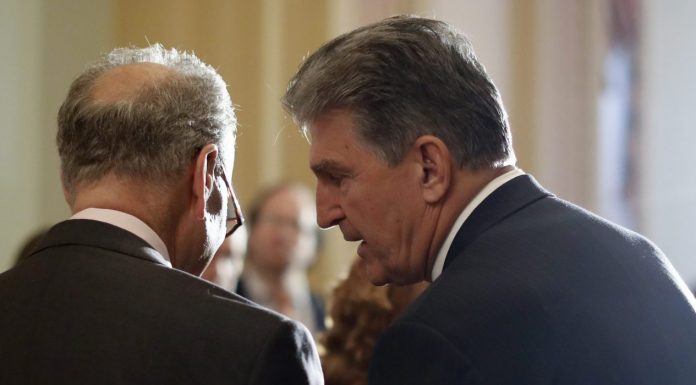(Headline USA) A whisker-thin Democrat majority in Congress is gearing up its attempt to ram through a partisan spending spree to pay for a radical legislative agenda beholden to the far Left.
There’s little doubt that Congress will again extend the government’s prolific spending when its borrowing authority expires in December.
How that unfolds, however, is uncertain.
Democrats still lack the votes to pass President Joe Biden’s leftist priorities into law, and Republicans are rightly concerned that Democrats might subvert the filibuster rule that allows the Senate’s minority party to have a voice and avoid majority mob-rule.
If either political party fails in its respective goals, the high-stakes outcomes could potentially be a federal default, the collapse of Biden’s partisan progressive agenda and a government shutdown.
Adding to the mix, lawmakers are looking to tee up issues for next year’s midterm elections, providing the potential to damage each party.
Among the the likely showdowns are future battles about capping a government-spending limit, which Sen. Minority Leader Mitch McConnell, R-Ky., has previously ignored in favor of continued fiscal irresponsibility, and has since said he won’t pull a repeat retreat on conservative principles.
McConnell said since summer that Republicans wouldn’t supply the votes majority Democrats needed to extend the federal debt limit.
But last week, 11 alleged Republicans including McConnell joined Senate Democrats in voting to approve $480 billion in new borrowing and spending. House passage is expected that would keep the money flowing and avoid a potential federal default and delay government checks to Social Security recipients and others.
Republicans want Democrats to raise the debt ceiling on their own to underscore the logic that Biden’s multitrillion-dollar social and environment agenda is unaffordable.
Democrats want Republicans to put their imprint on the borrowing limit increase, providing them cover on ballooning the national debt.
By enabling a two-month reprieve on the fight, McConnell angered Republicans who wanted a tougher stance against Democrats including Trump, still a force in the GOP. Even usual McConnell ally Sen. Lindsey Graham, R-S.C., called it “complete capitulation.”
Friday night, McConnell said he “will not provide such assistance again,” citing “grave concerns” over Democrats’ huge domestic bill and “hysterics” by Senate Majority Leader Chuck Schumer, D-N.Y.
Democrats need to gain traction for Biden’s increasingly unpopular and partisan $3.5 trillion spending binge that includes money for extreme climate change policy, partisan infrastructure boondoggles and increased taxes.
Yet, due to rational thinking from Democrat Sens. Joe Manchin of West Virginia and Kyrsten Sinema of Arizona, Biden has conceded that the final price tag might be a smaller but still staggering $2 trillion.
Facing possible unanimous Republican opposition and paper-thin congressional majorities, Democrats will need near unanimity to pull off their leftist push. The political consequences for Democrats would be jolting if Biden’s highest priority bill, along with an accompanying $1 trillion infrastructure package, crumble with his party holding the White House and Congress.
“I hope to God that is not the case,” Senate Budget Committee Chairman Bernie Sanders, I-Vt., said. He predicted both bills would pass but conceded “a horrible possibility” of failure.
Democrats have become increasing brazen in efforts for weakening filibusters, Senate procedures that have let Republicans retain a seat at the legislative table by requiring 60 votes in the 50-50 chamber to pass most bills. Manchin and Sinema have said they oppose that change, stymying that option.
GOP leaders worry that if a debt limit standoff moves to the brink of a default, Schumer might be able to persuade Manchin and Sinema to support erasing filibusters against spending increases. And that might lead to later, additional exceptions for voting rights or other radically liberal priorities.
Those fears are Republicans’ “most obvious challenge” in calculating how firm to be in the debt limit standoff, said Sen. Kevin Cramer, R-N.D. And four years of Trump’s presidency, the Jan. 6 protests and uprising at the U.S. Capitol and the high stakes for Democrats pushing Biden’s programs have taken a toll.
Frayed relationships are everywhere.
Manchin said that he didn’t want Democrats’ huge domestic programs bill, of which Sanders is a leading author, to make the U.S. “an entitlement society.” While Sanders criticized Manchin’s desire to pass more sensible climate change and health care provisions in the bill.
The two represent opposite ends of Democrats’ political spectrum. Still, it was a public airing of internal differences, and at a crucial moment.
In a letter to Biden, McConnell noted that Schumer’s “childish behavior” alienated Republicans who’d just helped pass the short-term debt limit extension, adding, “It has poisoned the well even further.”
Adapted from reporting by the Associated Press.

